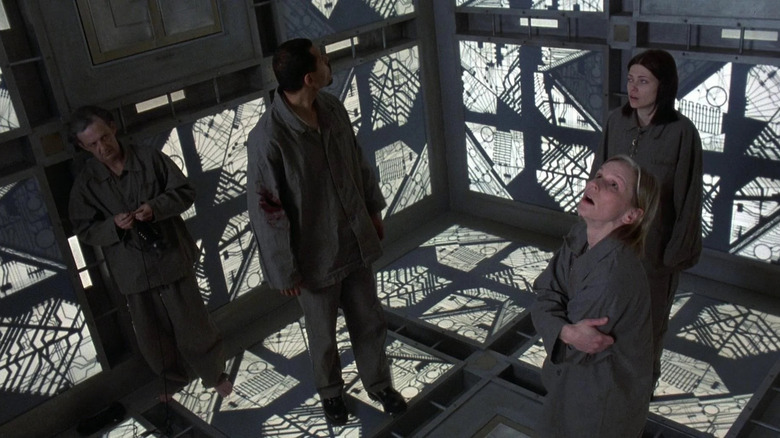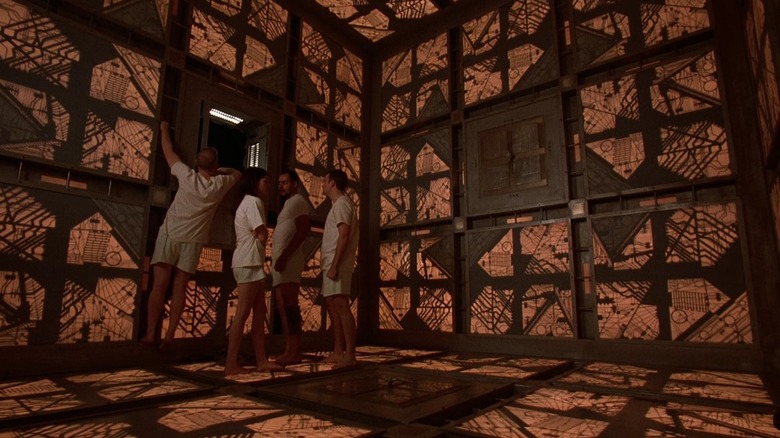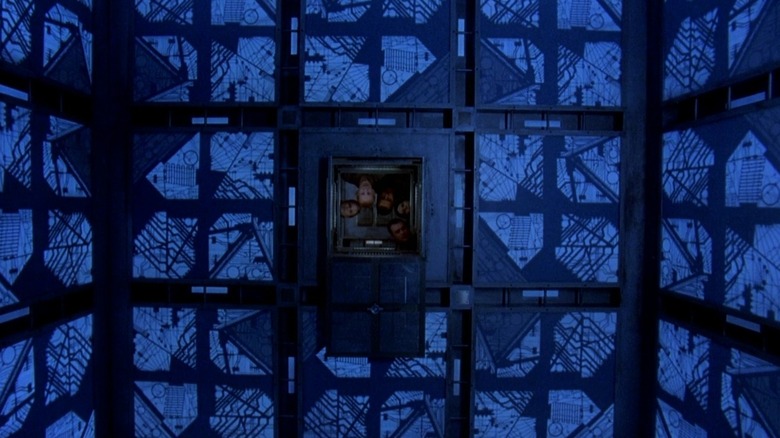Why Cube's Director Doesn't Want An American Remake Of The Sci-Fi Cult Classic
Vincenzo Natali's 1997 film "Cube" takes place entirely inside a strange, unexplained high-tech ... prison ... of some sort. It is constructed of cube-shaped cells with hatches on all four walls, the floor, and the ceiling. Each hatch leads into an identical cell, only distinguished by its colored lights and a series of cryptic numbers etched into the doorways. Random cells throughout the structure are armed with deadly booby-traps. There are no bathrooms, no food, and no water. Six strangers find each other in this prison wearing identical jumpsuits, unsure how they arrived there or why they have been imprisoned. They slowly begin to decipher the numbers to determine which rooms have traps and which ones do not. Naturally, they all slowly begin to go mentally deteriorate.
"Cube" was produced for a modest $350,000 (Canadian), but its intriguing "Twilight Zone" premise and taut direction allowed it to catch on as a cult hit. To offer an editorial, it's a pretty awesome flick. "Cube" made roughly $9 million at the global box office and become an even bigger hit on DVD. The film eventually spawned a sequel ("Cube 2: Hypercube"), a prequel ("Cube Zero"), and a Japanese remake. In 2011, there was an effort to make an additional sequel to be called "Cube 3-D," but that project stalled. In 2015, Lionsgate announced it would be remaking "Cube" under the title "Cubed," although, as of 2022, that project also had yet to manifest.
Natali spoke to MovieWeb in 2023 and he recognized that "Cube" was well-loved all over the world, but noted it was particularly lauded in France and Japan. He also talked about how remaking the film in the United States was a bad idea, as an American production studio would likely have nothing to add beyond mere production value.
The Japanese Cube remake
After "Cube," Natali would go on to direct notable Hollywood productions like "Splice," "Haunter," and "In the Tall Grass." He also directed multiple episodes of "Hannibal" and a few episodes of the 2020 "The Stand" miniseries. He posited that the reason "Cube" was so big in Japan was because he had chosen to deliberately — at least for a few scenes — shoot "Cube" in the style of Japan's master Yasujiro Ozu. "I would name different cubes depending on the style I was using," Natali said, "and there was an Ozu cube, where I was shooting it like in an Ozu movie. So it was already impregnated with them."
The 2021 Japanese remake of "Cube," directed by Yasuhiko Shimizu, shifted the focus of Natali's film to a central protagonist (played by Masaki Suda) and explained a little more about his backstory and his emotional journey within the Cube. Natali felt that the character-based approach was novel and differed from his original in a way that made the material feel refreshing. "I had a very light touch. I kind of wanted to stay out of the way," Natali said. "Whatever a remake is, it should define itself apart from the original, and I really didn't want it to be the original."
This is also why he felt that an American remake would be a bad idea. Natali had worked on enough American productions and observed enough Hollywood remakes to know how the remake machine operates. More than anything, he recognized that an American remake would likely try to retain the exact same ideas as his 1997 original, only with dozens of well-moneyed executives breathing down the filmmakers' necks. The only thing that could be added was a bigger budget, and that wasn't necessarily a good thing.
Cube, U.S.A.
Natali explained:
"I've never been enthusiastic about an American remake, because I just always felt like, well, it's gonna be the same thing. Except they probably won't have as much freedom, so that won't be as interesting, it would just be slicker. Whereas with the Japanese one, I felt like they can't help themselves. Even if they tried, they would never be able to do the first one over. And I think even though it is rather close, closer than I imagined it would be, it's still obviously very, very distinct. And it's another time, too. I mean, we're living in a very different time."
Natali likely means that the Canadian indie film scene in the mid-1990s was very welcoming to low-budget filmmakers presenting new, daring ideas into a varied marketplace. The '10s, meanwhile, was a time of ascendant, sky-high-budgeted ultra-blockbusters that exploded all over the cinematic marketplace. The '20s has, so far, seen the era of ultra-blockbusters slowly wither. Meanwhile, many legacy American film studios are actively dismantling whatever goodwill they accrued in the last century, all to make just a few more bucks before everything collapses entirely.
In such a marketplace, a "Cube" remake would only be put into production if a major studio could milk every possible fluid they could out of it, pretending that Natali's modest cult hit was an ultra-blockbuster this whole time. There's no way a "Cube" remake would earn a billion dollars.
Also, Natali loved "Cube" and is unwilling to sell it to a clumsy American studio only interested in marketing it to death. "I'll never get tired of talking about 'Cube,'" he said. "I mean, it's my baby. It was my first baby, the firstborn. And it was such a miracle that the film was made."


